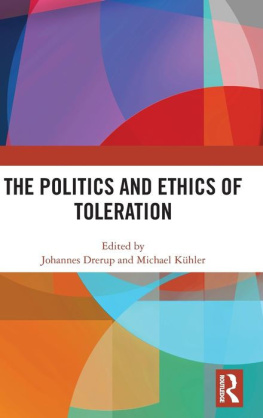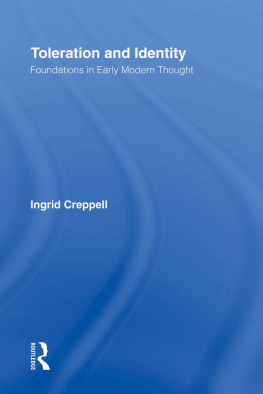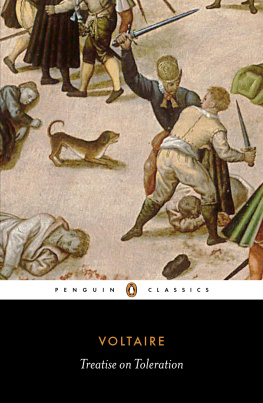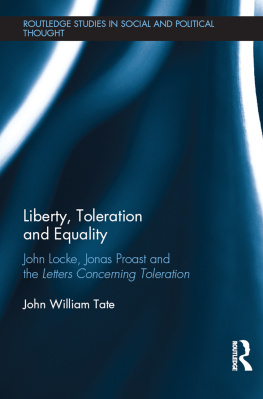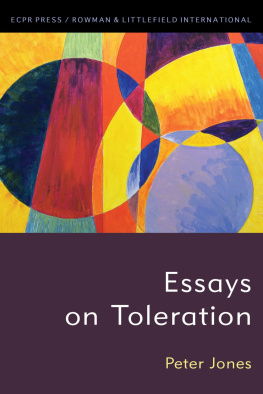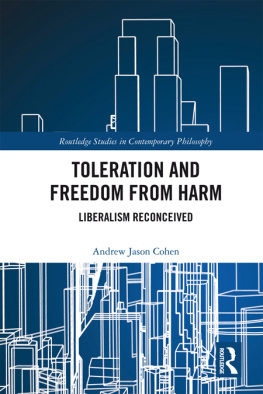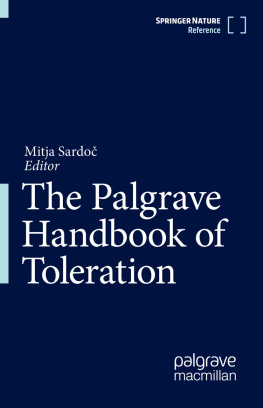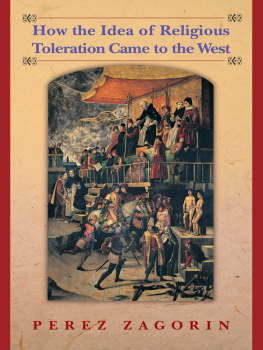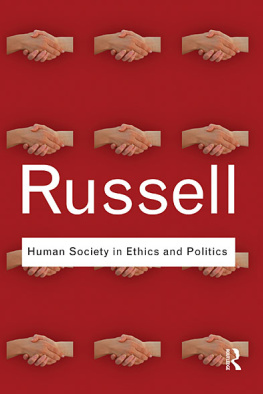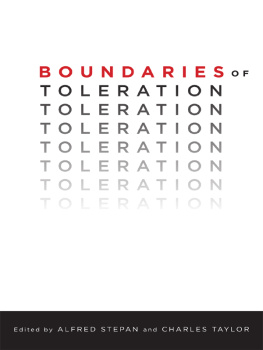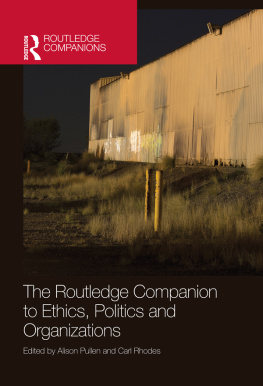The Politics and Ethics of Toleration
Toleration plays a key role in liberal thought. This book explores our current understanding of toleration in liberal theory and practice.
Toleration has traditionally been characterized as the willingness to put up with others or their actions or practices despite the fact that one considers them as objectionable. Toleration has thus been regarded as one of the core aspects of liberalism: as an indispensable democratic virtue and as a constitutive part of liberal political practice. In modern liberal societies, where deep disagreements about social values and ways of life are widespread, toleration still seems to be of crucial importance. However, contemporary debates on toleration cover an immense variety of theoretical and political issues ranging from controversies over its exact understanding and conceptual scope as well as its practical boundaries, e.g., regarding freedom of expression or the legitimate role of religious symbols in educational institutions. The contributions to this volume take up a number of carefully selected key questions and problems emerging from these ongoing theoretical and political controversies in order to explore and shed new light on pivotal conflicts and tensions that pervade different conceptions of toleration.
The chapters in this book were originally published in the Critical Review of International Social and Political Philosophy.
Johannes Drerup is professor of philosophy of education and educational theory at TU Dortmund and guest professor at the Free University of Amsterdam. His research interests include philosophy of education, educational theory, philosophy of childhood, and political and moral philosophy.
Michael Khler is Research and Teaching Fellow at the Academy for Responsible Research, Teaching, and Innovation (ARRTI) at Karlsruhe Institute of Technology (KIT), Germany, and Privatdozent at the University of Mnster, Germany. His research interests include ethics, metaethics, applied ethics, political philosophy, and the philosophy of love.
First published 2022
by Routledge
2 Park Square, Milton Park, Abingdon, Oxon, OX14 4RN
and by Routledge
605 Third Avenue, New York, NY 10158
Routledge is an imprint of the Taylor & Francis Group, an informa business
2022 Taylor & Francis
All rights reserved. No part of this book may be reprinted or reproduced or utilised in any form or by any electronic, mechanical, or other means, now known or hereafter invented, including photocopying and recording, or in any information storage or retrieval system, without permission in writing from the publishers.
Trademark notice: Product or corporate names may be trademarks or registered trademarks, and are used only for identification and explanation without intent to infringe.
British Library Cataloguing-in-Publication Data
A catalogue record for this book is available from the British Library
ISBN13: 978-0-367-68809-7 (hbk)
ISBN13: 978-0-367-68813-4 (pbk)
ISBN13: 978-1-003-13913-3 (ebk)
Typeset in Myriad Pro
by codeMantra
Publishers Note
The publisher accepts responsibility for any inconsistencies that may have arisen during the conversion of this book from journal articles to book chapters, namely the inclusion of journal terminology.
Disclaimer
Every effort has been made to contact copyright holders for their permission to reprint material in this book. The publishers would be grateful to hear from any copyright holder who is not here acknowledged and will undertake to rectify any errors or omissions in future editions of this book.
Johannes Drerup

and Michael Khler
Toleration is widely considered as one of the core values of liberalism. In modern liberal societies, characterized by deep disagreements concerning the nature of the good and the just, toleration is usually regarded as an indispensable democratic virtue and as a constitutive part of liberal political practice. Traditionally, toleration is characterized as the willingness to put up with, or to permit, actions or practices of others, which one disapproves of and which one otherwise would seek to prohibit or prevent from occurring. Contemporary debates on toleration thus cover an immense variety of theoretical and political issues ranging from controversies over its exact understanding and conceptual scope as well as its practical boundaries, e.g. regarding freedom of expression or the legitimate role of religious symbols in educational institutions to the French burqa ban.
The contributions to this special issue take up a number of carefully selected key questions and problems emerging from these ongoing theoretical and political controversies in order to explore and shed new light on pivotal conflicts and tensions that pervade different conceptions of toleration in liberal theory and practice. These political as well as ethical questions concern competing interpretations of structural elements of the concept and different conceptions of toleration, different accounts of the justification and value of principles and practices of toleration and the relationship between toleration as a liberal ideal and historically grown societal power structures. In so doing, the contributions focus both on more general questions concerning toleration as a central category for the definition of a moral and liberal political theory and on the theoretical analysis of the complexities of real-world cases of conflicts of toleration.
The first two contributions by Peter Knigs and Michael Khler both primarily focus on the theoretical clarification of conceptual issues. Knigss paper discusses and aims to dispel three puzzles which are commonly associated with the notion of toleration. These puzzles concern, firstly, the assumption that it is, at least at first glance, difficult to see why tolerance should be a virtue given that it involves putting up with what one deems wrong; secondly, the worry that the ideal of toleration is not fully realizable as toleration must necessarily be limited; and, thirdly, the assumption that true tolerance requires meta-tolerance, that is, the idea that the issue of toleration must itself be approached in a tolerant way.
Michael Khler addresses the question whether a value-neutral liberal state still needs toleration or is even compatible with it, for apparently neutrality leaves no room for the objection component of toleration to take hold. Khler argues that there is, indeed, conceptual and practical room left for a value-neutral liberal state to be tolerant. Drawing on the interplay between four kinds of reasons (pragmatic, ethical, moral, and political), he shows that pragmatic and political reasons may still provide the needed evaluative and normative ground upon which the combination of objection and outweighing acceptance, characteristic of toleration, can be made sense of. This implies, however, that the possible scope of toleration for a value-neutral liberal state is considerably limited.
John Hortons and Andrew Jason Cohens contributions each provide an analysis of the justification and value of principles and practices of toleration in different sociopolitical contexts. Through a critical engagement with the work of John Gray, Hortons paper explores connections between the ideas of toleration and modus vivendi. In particular, he argues that, while Gray is right to see a connection between modus vivendi and a particular conception of toleration (labelled the traditional conception, which incorporates an objection component), it is both problematic and potentially confusing to tie either of these ideas, as he does, to a theory of value-pluralism. According to Horton, they should instead be viewed as distinct but partially overlapping and often mutually supportive ideas, their relevance being explained best in terms of the need or desire of people to live together under conditions of conflict about the validity of different ways of life, and motivated by a variety of pragmatic and principled concerns. His paper also offers a modest defence of the traditional conception of toleration against some of its critics, arguing that such a practice of toleration, if supported by a modus vivendi, can provide a peaceable means of accommodating differences in a way that is broadly accepted, although neither ideal nor necessarily uncontested, by both tolerators and the tolerated.
 and Michael Khler
and Michael Khler
